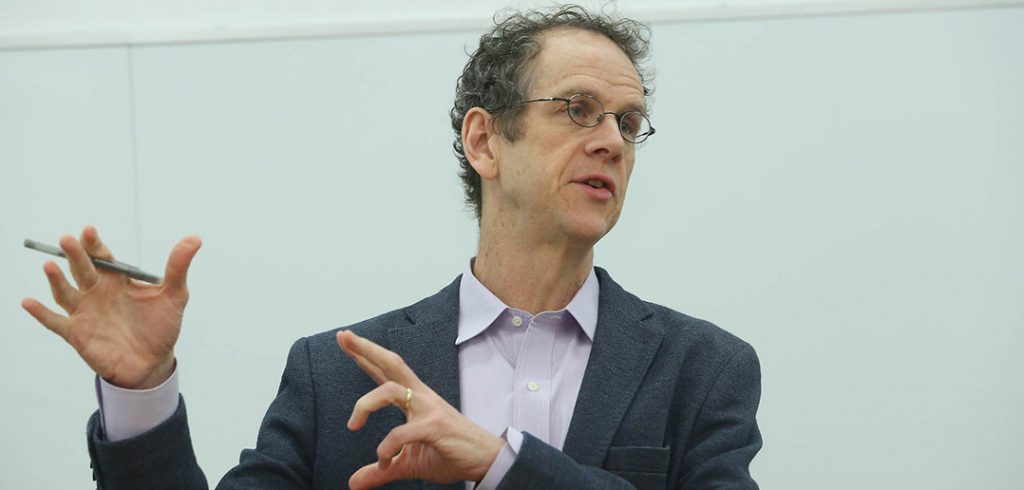There are benefits to banning “offensive” speech, but those benefits are overwhelmingly overshadowed by the cost, the American Civil Liberties Union’s lead lawyer said on April 14 at the Lincoln Center campus.
In the keynote address for the conference “Hate Speech, Free Speech, A Workshop on the Politics of Language on College Campuses,” David Cole, National Legal Director of the ACLU, laid out three rationales for banning offensive speech, and then presented three reasons why the idea is counterproductive and dangerous.
College campuses are particularly important places to address the subject, he said, because a 2015 Pew Charitable Trust poll found that 40 percent of millennials support government suppression of speech.
“Those who care about maintaining a robust principle of freedom of expression on college campuses need to address our arguments principally to progressives, because I think that’s where the challenge to free speech on college campuses, at this particular moment, is coming from,” Cole said.
Arguments For and Against
His arguments against restricting speech on campus were that free speech is critical to the college experience because it promotes critical inquiry, and since students will be leaders of tomorrow, they will determine what free speech looks like in the future. Further, restricting speech is counterproductive, he said, because it elevates the same speech it seeks to suppress.
On the other hand, Cole said a case can be made for restricting speech, because some forms of speech undermine equality and enable speakers to intimidate others into silence. Some speech is also just inflammatory and not well thought out, and thus contributes nothing of value to society.
Of the first argument against restricting it, Cole said that universities have in recent years taken on a greater role as dialogue centers, because outside of campus, Americans are retreating to “safe spaces” organized by class, race, and ideology, and rarely encounter those they disagree with.
“The whole notion of diversity is we are stronger as an educational institution if we can bring different voices together and have them confront each other and learn from those different experiences. Because colleges are selective, they can actually do that,” he said.
Unintended Consequences
Stifling free expression has also long had unintended consequences, he said. In the 1990s, for instance, Cole defended the Old Glory condom company when it was denied a trademark for its prophylactics with American flags on them because the trademark office considered it offensive. As long as the company was losing its free-speech battle in court, it earned tremendous free publicity. But when it finally won, the attention evaporated and the company folded.
“Suppressing is frequently counterproductive. Milo Yiannopoulos and Ann Coulter know this, and they want to be suppressed,” he said. “They want to have the authorities or the students stop them from speaking, because that gives them a platform that they otherwise would not have.”
Cole was sympathetic to the notion that by protecting offensive speech, the First Amendment inadvertently promotes inequality, but he said that misses the point that other sections of the Bill of the Rights do the same. The right to private property, for example, allows those who can afford it to profit from it mightily, while the right to choose where you educate children means the rich can support private schools and advocate policies that deprive public ones.
The cost of sacrificing free expression is much higher though, and one only need look back to times when the U.S. did regulate speech from the 1920s through the 1970s. At the time, the governments’ rationale for suppressing speech that advocated violence or criminal conduct was that people could be harmed. It was a reasonable assumption, Cole said, but one that the government routinely took too far and abused.
“Who was targeted when the government had the power to target speech that advocated criminal conduct or violence? It was anarchists, communists, and civil rights activists—those who were challenging the majority,” he said.
When Censorship Makes Sense
Banning speech simply because it’s inflammatory and offensive actually makes the most sense in an academic setting, Cole said, where respectful dialogue is key. He made a distinction between a speaker who espouses ideas that could be offensive but does so in a respectful manner—Charles Murray, co-author of the controversial The Bell Curve (Free Press, 1994), for example—and one who’s nothing more than a provocateur, he said, like Yiannopoulos.
He said this sort of censorship should not be applied outside of the campus, however, nor should it be applied to student-organized events.
“Free speech is critical to the maintenance of democracy. What the First Amendment protects is civil society, which is an absolutely essential ingredient in a liberal democracy,” he said.
“It’s why when authoritarian figures take power, they target [the press]for suppression.”
Workshop sessions at the conference included “Keywords” and “Situations on the Ground.” Lane Green, language columnist for The Economist, delivered an afternoon keynote address. The event was sponsored in part by Fordham’s Department of Sociology and Anthropology and the Fordham Dean’s Fund.

